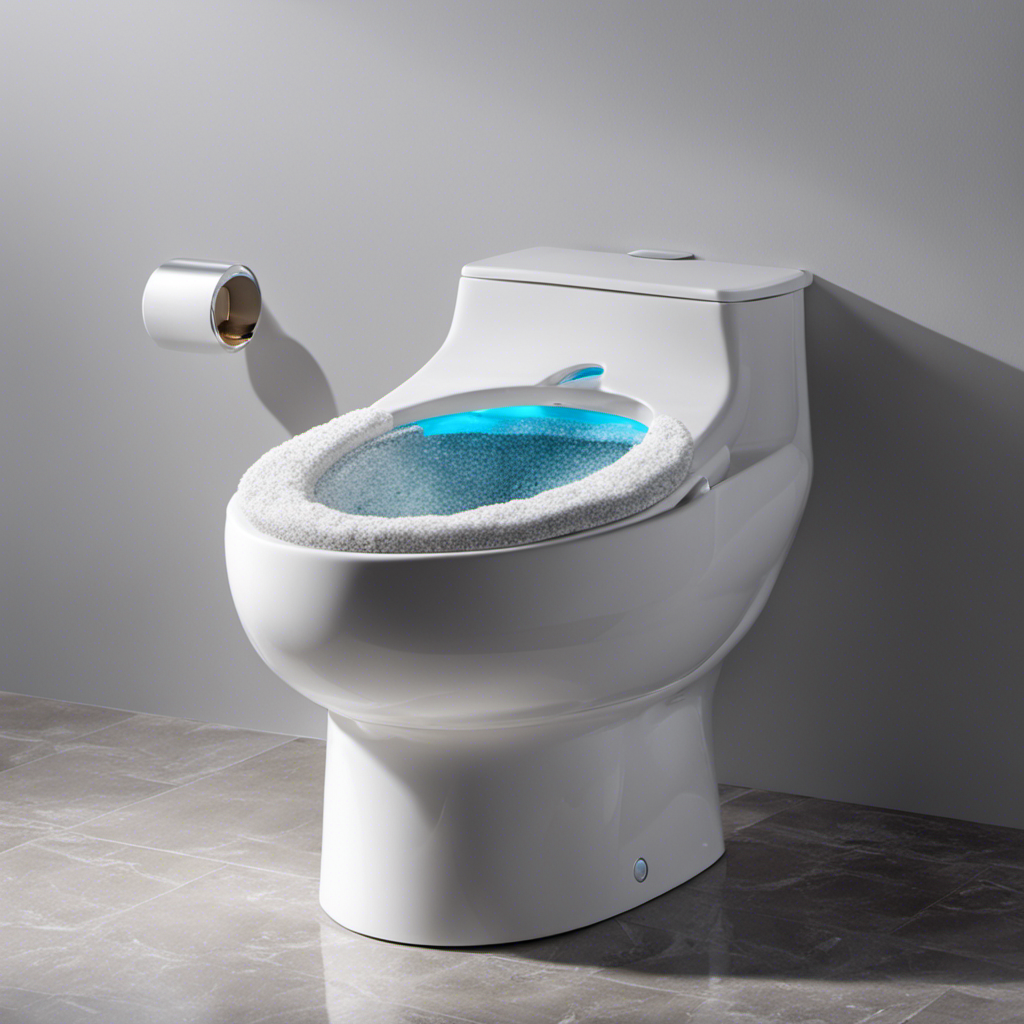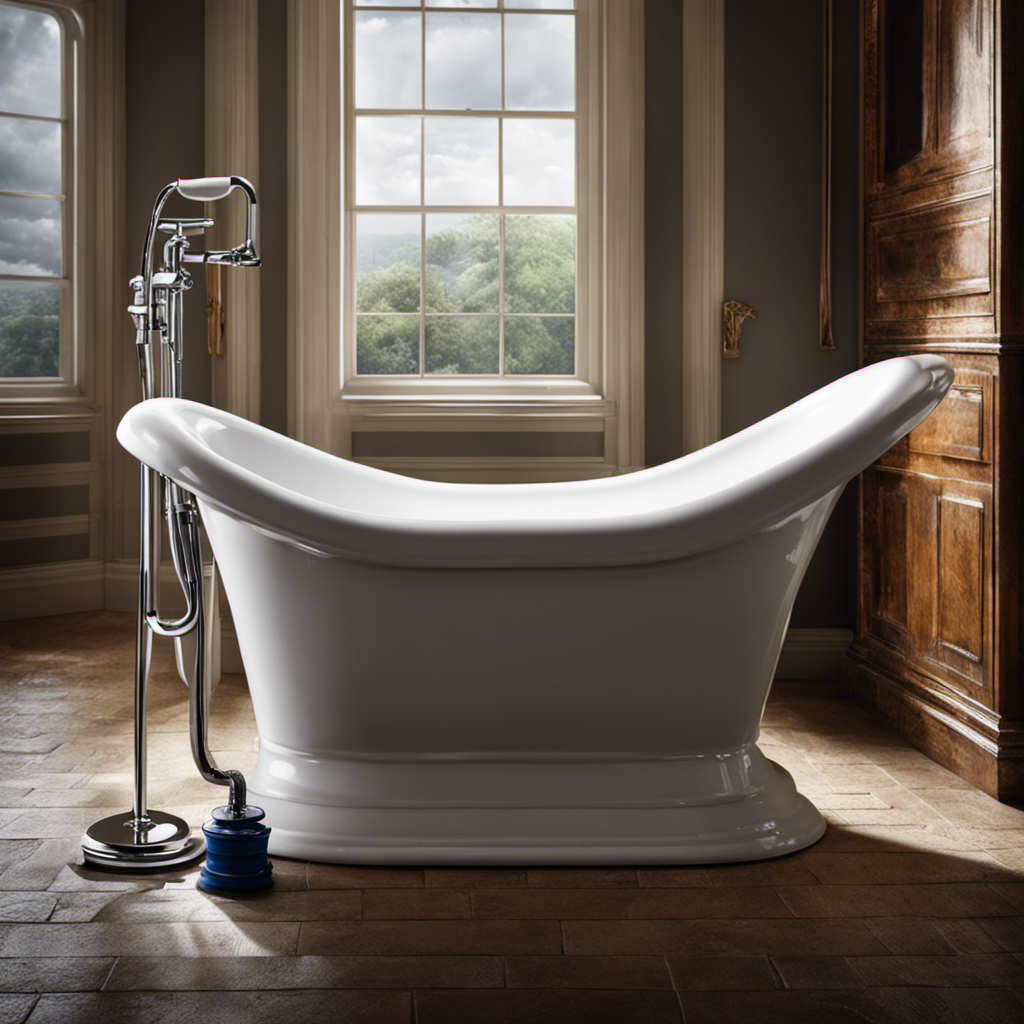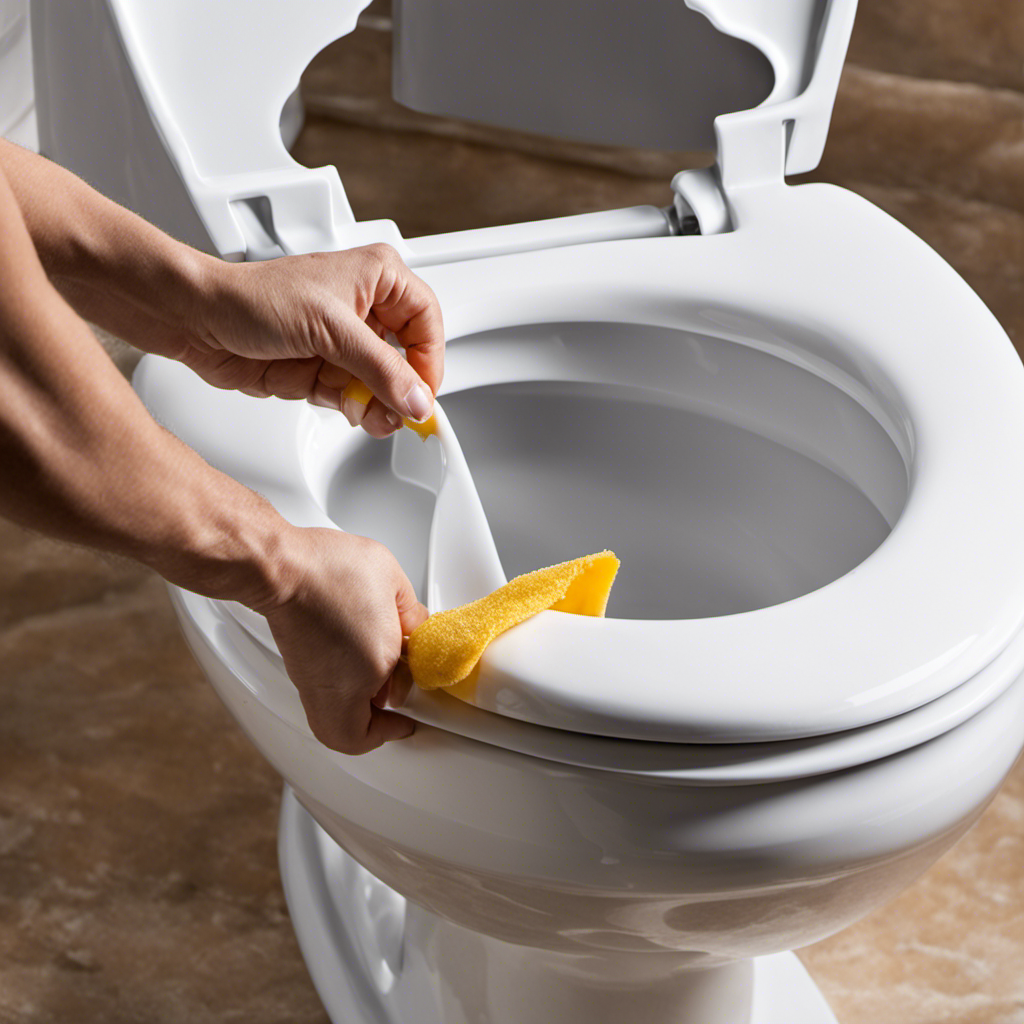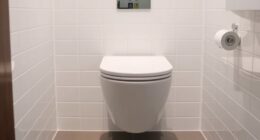I’ve battled with hard water rings in my toilet for years, and let me tell you, it’s no easy feat. But fear not! I’ve gathered the knowledge and techniques needed to conquer this pesky problem once and for all.
In this article, I’ll share effective cleaning methods, natural remedies, and preventive measures to help you bid farewell to those stubborn hard water rings.
So get ready to restore your toilet’s pristine shine and say goodbye to those unsightly stains!
Key Takeaways
- Hard water rings in toilets are caused by mineral deposits left behind by hard water.
- Promptly addressing the issue is important to prevent further damage.
- Using a mixture of vinegar and baking soda is an effective cleaning method.
- Water softening options can help reduce mineral content and prevent hard water rings.
Understanding the Hard Water Ring Problem
You’ll want to start by understanding what causes the hard water ring in your toilet. The main culprit behind this annoying problem is the mineral deposits left behind by hard water.
Hard water contains high levels of minerals like calcium and magnesium. When the water evaporates in the toilet bowl, these minerals are left behind and form a hard, stubborn ring.
This ring is not only unsightly, but it can also have an impact on your plumbing. The mineral deposits can clog pipes and reduce water flow, leading to potential plumbing issues in the long run.
It’s important to address this issue promptly to prevent further damage.
Identifying the Causes of Hard Water Rings in Toilets
It’s important to understand the causes of those stubborn stains in your toilet bowl. Hard water rings in toilets are a common problem that can be caused by several factors.
Here are some common causes of hard water rings in toilets:
- High mineral content in the water supply, such as calcium and magnesium, can contribute to the formation of hard water rings.
- Infrequent cleaning or inadequate cleaning techniques can allow mineral deposits to accumulate and form stubborn stains.
Identifying these causes is crucial in order to effectively remove and prevent hard water rings. It’s worth noting the harmful effects of these stains as well. Not only do they make your toilet look dirty and unappealing, but they can also harbor bacteria and contribute to unpleasant odors.
Therefore, understanding the causes and taking appropriate measures to address them is essential for maintaining a clean and hygienic toilet bowl.
Effective Cleaning Methods for Hard Water Rings
To effectively remove those stubborn stains in your toilet bowl, try using a mixture of vinegar and baking soda. This combination works wonders as a natural cleaning solution and is one of the best eco-friendly alternatives to harsh chemical cleaners.
Simply sprinkle baking soda around the inside of the toilet bowl, making sure to target the areas with hard water rings. Then, pour vinegar over the baking soda and let the mixture sit for about 15 minutes. This allows the acid in the vinegar to break down the mineral deposits causing the hard water rings.
After the allotted time, scrub the bowl with a toilet brush and flush. The vinegar and baking soda combination will leave your toilet bowl sparkling clean and free from those unsightly hard water rings.
Now, let’s explore some other natural remedies to remove hard water rings.
Natural Remedies to Remove Hard Water Rings
For a more environmentally friendly approach, try using lemon juice and salt to tackle tough mineral deposits in your toilet bowl. Lemon juice is a natural cleaning solution that contains citric acid, which breaks down hard water stains. Salt acts as an abrasive that helps scrub away deposits.
Here’s how you can use these ingredients effectively:
- Mix equal parts lemon juice and salt to form a paste.
- Apply the paste onto the hard water ring.
- Let it sit for about 30 minutes to allow the citric acid to work.
- Scrub the area using a toilet brush or scrub sponge.
- Rinse thoroughly with water.
Alternatively, you can also try using a mixture of vinegar and baking soda, both known for their cleaning properties.
Preventive Measures to Avoid Hard Water Rings
When it comes to preventing hard water rings, there are two key points to consider: water softening options and regular cleaning techniques.
Water softening options, such as using a water softener or adding a water conditioner, can help reduce the mineral content in the water and prevent the formation of hard water rings.
Additionally, regular cleaning techniques, such as using mild detergents and scrubbing with a non-abrasive sponge, can help remove any existing deposits and keep the surfaces free from hard water stains.
Water Softening Options
There are several options available for softening water to prevent hard water rings in the toilet. One effective method is to install a water softening system in your home. These systems use ion exchange to remove minerals like calcium and magnesium that cause hardness in water. Not only does this help prevent hard water rings in the toilet, but it also offers several other benefits.
Improved water quality:
- Softened water is free from mineral deposits, making it better for bathing, washing dishes, and laundry.
- It can also help extend the lifespan of appliances by reducing scale buildup.
Cost savings:
- Softened water requires less soap and detergent, resulting in savings on cleaning products.
- It can also lead to reduced energy consumption as appliances operate more efficiently.
Investing in a water softening system is a long-term solution that offers numerous advantages beyond just preventing hard water rings in the toilet.
Regular Cleaning Techniques
Regular cleaning techniques can help maintain the cleanliness and freshness of your toilet. There are several methods you can use to keep your toilet free from stains and odors. One effective technique is to use a toilet bowl cleaner that contains bleach or hydrogen peroxide. These ingredients help break down and remove tough stains, including hard water rings. Additionally, regular scrubbing with a toilet brush can help prevent buildup and keep your toilet looking pristine. Another alternative cleaning method is to use natural ingredients, such as vinegar or baking soda. These substances can be mixed with water to create a paste that can be applied to the stains and left to sit for a few minutes before scrubbing. It’s important to remember to wear protective gloves when using any cleaning products and to always follow the instructions on the packaging.
| Cleaning Technique | Advantages |
|---|---|
| Toilet bowl cleaner with bleach or hydrogen peroxide | Effective in removing tough stains |
| Regular scrubbing with a toilet brush | Prevents buildup and keeps toilet clean |
| Natural ingredients like vinegar or baking soda | Safe and eco-friendly alternative |
Regular cleaning techniques are essential to maintaining a hygienic and odor-free toilet. By using the right cleaning products and techniques, you can easily tackle hard water rings and keep your toilet looking and smelling fresh.
Professional Solutions for Stubborn Hard Water Rings
When it comes to tackling stubborn hard water rings, it’s important to have effective cleaning products on hand. These products are specifically formulated to dissolve and remove mineral deposits, making the cleaning process easier and more efficient.
However, if you prefer a more natural approach, there are also DIY home remedies that can be effective in removing hard water stains.
Additionally, to prevent future buildup and maintain a clean toilet, regular prevention and maintenance practices should be implemented. This can include using a water softener or regularly cleaning with vinegar or lemon juice.
Effective Cleaning Products
One of the most effective cleaning products for removing hard water rings in the toilet is a mixture of vinegar and baking soda. This combination creates a powerful cleaning agent that can break down and dissolve the mineral deposits that cause the rings.
Here are some key points to consider when using this eco-friendly alternative:
- Vinegar acts as a natural acid that can dissolve mineral build-up.
- Baking soda is an abrasive substance that helps scrub away the stubborn stains.
- Mix equal parts vinegar and baking soda to create a paste-like consistency.
- Apply the mixture directly to the hard water ring and let it sit for at least 30 minutes.
- Use a toilet brush or scrubbing pad to scrub the area gently.
- Flush the toilet to rinse away the mixture and reveal a clean, ring-free surface.
DIY Home Remedies
Using DIY home remedies can be a cost-effective and natural way to address common household issues.
When it comes to tackling stubborn hard water rings in the toilet, there are several DIY cleaning hacks and homemade toilet cleaners that can do the job effectively.
One such remedy is using vinegar and baking soda. Simply pour a cup of vinegar into the toilet bowl and let it sit for a few hours. Then, sprinkle baking soda on the ring and scrub it with a toilet brush.
Another option is to make a paste using borax and lemon juice. Apply the paste to the ring, let it sit for a while, and then scrub it off.
These DIY remedies are not only effective but also environmentally friendly, making them a great choice for maintaining a clean and healthy home.
Prevention and Maintenance
To prevent future build-up, you should regularly clean your toilet bowl with a mixture of vinegar and baking soda. This simple and effective solution not only removes existing stains but also helps in preventing new ones from forming.
Here are some key points to keep in mind for preventing stains and maintaining cleanliness:
- Use the vinegar and baking soda mixture at least once a week to clean the toilet bowl.
- Scrub the bowl thoroughly with a toilet brush to remove any residue or build-up.
- Consider using a toilet bowl cleaner specifically designed to prevent hard water stains.
- Flush the toilet regularly to prevent any stagnant water from causing stains.
- Wipe down the exterior of the toilet with a disinfectant to maintain overall cleanliness.
- Avoid using harsh chemical cleaners as they may damage the toilet bowl surface.
Frequently Asked Questions
Can I Use Regular Household Cleaners to Remove Hard Water Rings in My Toilet?
Yes, you can use regular household cleaners to remove toilet bowl stains. There are DIY toilet cleaning methods available that can effectively eliminate hard water rings and restore the cleanliness of your toilet.
Will Using Bleach Damage the Toilet Bowl When Trying to Remove Hard Water Rings?
Using bleach to remove hard water rings can damage the toilet bowl. Consider using vinegar, a natural alternative, instead. Commercial toilet cleaners are effective but may have drawbacks.
How Long Does It Usually Take for Natural Remedies to Remove Hard Water Rings in Toilets?
When using natural remedies to remove hard water rings in toilets, the time it takes can vary depending on the severity of the ring. It’s important to avoid common mistakes like using harsh chemicals that can damage the toilet bowl.
Can Hard Water Rings in Toilets Be Prevented by Using a Water Softener System?
Using a water softener system can prevent hard water rings in toilets. The benefits include reducing mineral buildup and making cleaning easier. Alternatives to water softeners include using vinegar or lemon juice for cleaning.
Are There Any Professional Services Available Specifically for Removing Hard Water Rings in Toilets?
Yes, there are professional services available for removing hard water rings in toilets. However, it is also possible to use DIY methods to get rid of these stains.
Conclusion
In conclusion, removing hard water rings in toilets can be a frustrating task. But with the right methods and preventive measures, it is possible to keep your toilet clean and free from unsightly stains.
As the saying goes, ‘An ounce of prevention is worth a pound of cure.’ By regularly cleaning your toilet using effective cleaning methods and implementing natural remedies, you can easily get rid of hard water rings.
And if all else fails, don’t hesitate to seek professional solutions to tackle stubborn stains.










